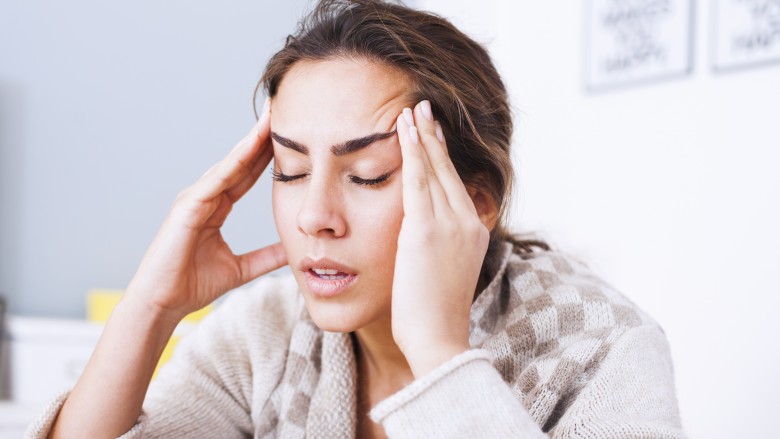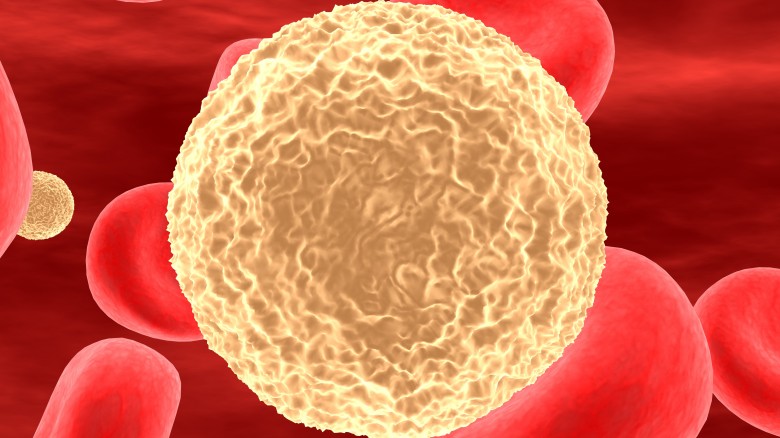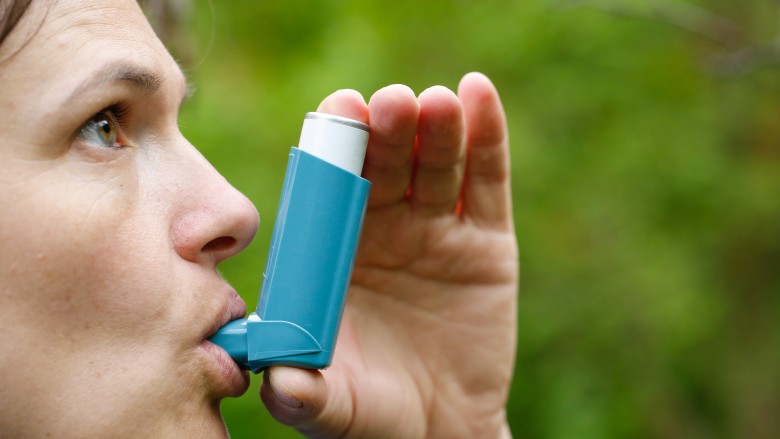What Really Happens To Your Body When The Weather Changes
April showers bring May flowers, as the saying goes, right? Well all of those weather changes can wreak serious havoc on your body, health, and overall wellbeing. Some people swear that they can feel pain deep in their joints when a rainstorm is brewing. Others suffer from debilitating seasonal allergies and asthma as pollen counts climb and the weather gets warmer.
While science hasn't conclusively determined the link (or if there even is a link to begin with) between rain and rheumatism, the large number of people who claim to experience pain, discomfort, and swelling suggest that it's possible that there could be a connection. Allergies and asthma have a more established connection to weather changes. Seasonal allergies are often caused by pollinating plants and, according to pollen.com, there are different types of pollen based on which plants are pollinating at a given point over the course of the year. Levels can be higher or lower based on where you are, so if you suffer from seasonal allergies, you may want to research what pollen levels will be at your destination.
Changing weather also affects your body in other ways, some of which are potentially much more dangerous. From headaches to heart attacks, here's what can really happen to your body when the weather changes.
Blood pressure is affected by pressure systems
Your blood pressure can change due to a number of different reasons and weather is no exception. As Jennifer Vanos, an assistant professor of geosciences at Texas Tech University told The Weather Channel, changing weather pressure systems also cause your blood pressure to change. This can, in turn, lead to other conditions.
Additionally, a study published in the European Heart Journal found that cold weather might cause your blood pressure to spike, in part due to the narrowing of blood vessels that happens in colder temps.
Headaches may spike
As someone who has long suffered from chronic headaches, I know all too well that weather can cause headaches or even migraines. Extreme weather changes, blinding sunshine, and pressure-changing storms can all cause migraines, while headaches can spike in cold weather due to the constriction of blood vessels in the brain, according to the Mayo Clinic.
A study published in the journal Headache, also found that weather can affect headaches and migraines, with some people sensitive to multiple different types of weather changes. Knowing that your headaches or migraines might be caused by the weather can help you stay ahead of any pain, so that you can avoid them entirely or act quickly to treat them right away.
Sleep increases in the fall
According to a study published in the Journal of Psychosomatic Research, hypersomnia, which is the exact opposite of insomnia, can peak for some people when the air starts to crisp up. Researchers found that participants in the study slept nearly three hours more each day in October than at any other time of the year.
You would think that means that in the fall we're more well rested, right? It turns out that isn't entirely true. In the fall you sleep more, but you're less rested, as the study also concluded that the darkening of the days and increased rain causes you to feel sleepier and groggier during the day.
Inflammation increases in the winter
According to a study published in Nature Communications, the way your DNA functions (thanks to a process called gene expression) changes as the seasons do. In the winter, when the weather gets colder outside, that means increased inflammation. The change is designed to help your body be better equipped to fight off colds and flus. In the summer, your cells are instructed to retain water and burn fat. That's right, your actual DNA changes when the weather changes. That's major.
The season may impact the sex of your baby
While you might think that your chances of having a boy or a girl are fairly evenly split, that may not actually be true. According to a study published in Biology Letters, you're more likely to conceive a boy during warm parts of the year and more likely to conceive a girl when it's colder.
That means that years (or seasons) that are exceptionally or unseasonably warm or cold could have an impact on the makeup of the general population, an interesting thing to consider while studying the effects of changing climates on human health and wellbeing.
Dry skin increases in the winter
Does your skin get painfully dry in the winter? Mine too. California-based dermatologist Tsippora Shainhouse told Women's Health that that's because the air outside is drier, which means your skin isn't getting the moisture it normally gets from the environment when it's warmer and more humid outside.
"Strong winds will dry and irritate the skin and potentially damage the skin's protective lipid barrier," Dr. Shainhouse said. Moisturizer's your friend all year, but especially in the winter.
Suicide increases in the warm months
Suicide rates rise and fall as the weather changes, as well. Grady Dixon, Ph.D., a biometeorologist who studies how weather and climate change impact emotional health, told The Weather Channel that suicides are highest in late spring and early summer.
A study published in Epidemiology found that in the northern hemisphere, when it's sunniest in the summer, suicide rates peak in June, while in the southern hemisphere, where seasons are flipped, suicide rates peak in December.
Heart attacks increase in colder months
Heart attack risk is higher when it gets colder outside, according to Harvard Health Letter. Because of this increased risk, minimizing your added risk is important.
Your blood flow slows when the weather is cold, which can make your heart muscle to try harder to get the oxygen-rich blood it needs. Avoiding situations that might makes things worse can limit your chances of having a heart attack.
Energy levels decrease in the winter
Have you ever noticed that you get a little bit sad and lethargic in the winter, when there's much less sunlight? That's a real disorder, called Seasonal Affective Disorder (SAD). According to an article published in Psychiatry, higher levels of melatonin coupled with lower levels of serotonin make you feel sleepier and less happy in the colder months.
Blood sugar is less stable when it's cold
When your blood thickens as the temperature falls, you might have a harder time keeping your blood sugar at a fairly stable level as well.
Vanos also told The Weather Channel that "[d]iabetics will have more trouble controlling their blood sugar during cold fronts." Since controlling the disease hinges on being able to control your blood sugar, that can be problematic.
Your hair and nails are weaker in cold weather
Just like cold weather affects your skin by drying it out, your hair and nails are affected too. "In cold weather, the small blood vessels on your skin, fingers, and toes become more narrow, reducing the flow of blood and the delivery of nutrition and oxygen," Dr. Xiang Li, an internist at Tri-City Medical Center in California, told Women's Health. Less oxygen-rich blood means weaker hair and nails, which can also dry out when temperatures drop.
Breathing difficulties can increase in extreme temperatures
You might find it hard to breathe when it's either too warm and humid or too cold and you aren't alone. According to a blog post that Dr. Oz penned for The Huffington Post, cold air causes small cracks to form in the lining of your bronchial tubes, which makes it hard and painful to breathe.
And when it's hot and humid outside, the air can feel heavier, which makes breathing taxing. Add pollution to that and it gets even more difficult. According to the American Lung Association, this is especially true for those who have pre-existing lung conditions.
Your immune system is weaker in the winter
When it gets cold, your immune system weakens, according to a study from Yale University. Cold weather weakens immune defenses present in your nose, which are supposed to be the first to fight off cold and flu viruses.
This study shows that there might be a biological link between increased rates of colds and winter temperatures, rather than just that people get colds because they spend more time in close contact in the winter.
Changing weather changes your health status
When the weather changes and it gets cold or hot, it gets humid or dry, or the pressure changes, it affects your body. You might be more likely to get sick, you might suffer pain or discomfort, or it might raise your risks of developing certain conditions.
The weather outside affects people much more personally than just what you need to wear or if you need to grab an umbrella. Knowing how weather can affect you allows you to take control of your health—or at least know why things are happening the way they are.














